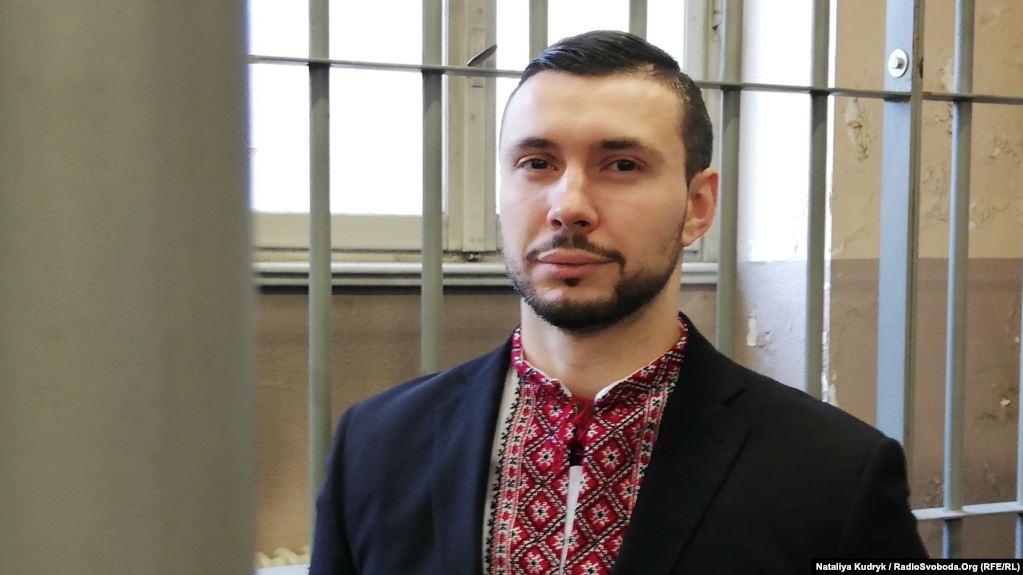On July 12, Vitaliy Markiv was sentenced to 24 years in prison for alleged complicity in the death of Italian photojournalist Andrea Rocchelli during a shootout in the Donbas five years ago. The Italian jurors and judges state that Vitaliy Markiv, soldier of the National Guard of Ukraine, was actively involved in the intentional killing of foreign journalists near then-occupied Sloviansk.
The statement of reasons contains 176 pages. The judges state that the accused was on Mount Karachun on that tragic day, May 24, 2014, that he could see the Zeus Ceramica factory from his position, and that he had good visual control of the railway, where Italian photographer Andrea Rocchelli and his Russian interpreter Andrei Mironov were killed.
According to the judges, Markiv himself gave a detailed description of the course of events to Italian journalist Ilaria Morani, whose article in Corriere della Sera is referred to as “the soldier’s direct confession and an important element of the prosecution’s evidence.” The defense team regards this newspaper article as Morani’s “personal and false interpretation of the telephone conversation” that took place between Markiv and some Italian journalists. Basing their statement of reasons on Morani’s description of the events near Sloviansk, the Pavia jury writes:
“Even though the enemy was not launching any attacks at that time, Markiv, who was in command at his combat position, saw the journalists moving towards the train, and decided it was time to respond. He began 'firing at everything and anything that moved within a two-kilometer radius,' which was a common practice for both the National Guard and the Ukrainian Army.”
The Italian judges maintain that “the defendant himself confirmed this reconstruction of events when he stated that even though there was no active confrontation or persons wearing separatist uniforms in the area, it was normal to suspect civilians as likely adversaries, since they could provide useful information to the separatists.” Thus, the judges conclude that Markiv used his AK74 (a Kalashnikov assault rifle) to open fire on the journalists near the Zeus Ceramica factory.
“However, as he couldn’t reach the targets (journalists) with his Kalashnikov, he continued tracking them through the Kalashnikov optical system, informed his superior and men, who were 'using heavy artillery,' with the obvious intention of hitting the taxi in order to prevent the journalists from escaping, and to stop and eliminate the journalists in the forest area where they were hiding. Then, using a radio device, Markiv communicated the details of their whereabouts, thus helping to direct the gunfire in their direction. As a result, French journalist William Roguelon was seriously injured, while Rocchelli and Mironov were killed on the spot.”
The Pavia judges assert that “Markiv complied with a clearly illegal order that violated the provisions of the 1950 Geneva Conference relative to the Protection of Civilian Persons in Time of War.” The judges underline that the document specifically prohibits violence against and murder of persons who are not directly involved in a conflict, including journalists who report on war events. They insist that Ukrainian forces launched the attack without any provocation or attack from the enemy. Instead, they underline that “the attack (by Ukrainian forces-Ed.) was directed against journalists who were exercising their right to gather information about the ongoing conflict.”
Markiv’s advocates insist that the shots were fired by the pro-Russian fighters, and as Markiv was on friendly terms with the Italian journalists, he could not have intentionally decided to open fire on foreign reporters.
The judges dismissed all the arguments of the defense team, stating that no documentary evidence or testimony had been provided to fully substantiate Markiv’s complicity in this incident. The testimonies provided by the National Guard commander and other Ukrainian servicemen, who testified in the Pavia court are “inconclusive and contradictory,” say the judges.
In both the pre-investigation documents and in the description of the tragic events, the judges write that the incident took place “in the midst of the civil conflict in Ukraine, where government forces are fighting against pro-Russian separatists.” The judges refer to French journalist William Roguelon as a “reliable witness” and Italian reporter Ilaria Morani as a “professional journalist.” However, Markiv’s lawyers consider Roguelon “more of a victim than a witness,” and Morani as a reporter, who “for fame and publicity, greatly exaggerated and distorted the facts that she recorded in her interview with Markiv.”
The defense team is currently examining the statement of reasons and plans to appeal the court decision within the next month and a half. As soon as the verdict was pronounced in July, Vitaliy Markiv’s lawyers announced their intention to appeal the Pavia court’s decision in the Milan Court of Appeal. The Ministry of Internal Affairs of Ukraine is working on the translation of the sentence and promises to do everything possible to release the National Guardsman.
30-year-old Vitaliy Markov has Ukrainian and Italian citizenship; he has been in custody in Milan for over two years. He denies his complicity in the killing of Rocchelli and Mironov in the Donbas, and is ready to appeal the court decision
Ukraine’s Interior Minister Arsen Avakov called the verdict unfair and announced that it would be appealed.
Markiv’s defense team say that the verdict is “politically motivated.” They add that the decision of the court of appeals can be expected in the spring of 2020.
President Volodymyr Zelenskyy has instructed the Foreign Ministry and the Prosecutor’s Office to “make every possible effort” to have Markiv released.
Read more:
- Facts and questions in Italy's dubious trial of Ukrainian soldier Vitaliy Markiv
- Soldier Vitaliy Markiv… as told by friends, relatives & acquaintances
- Letter from soldier Vitaliy Markiv, sentenced to 24 years by an Italian court
- Vitaliy Markiv’s lawyer calls on Ukrainian authorities & media community to take action
- In Russia’s Shadow: details of Markiv case exposed in Italian Senate in Rome
- French journalist calls Markiv sentence “mind-blowing” & is willing to testify





